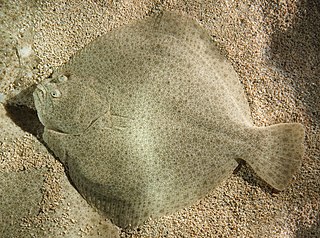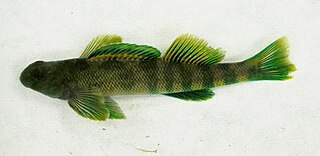
A tuna is a saltwater fish that belongs to the tribe Thunnini, a subgrouping of the Scombridae (mackerel) family. The Thunnini comprise 15 species across five genera, the sizes of which vary greatly, ranging from the bullet tuna up to the Atlantic bluefin tuna. The Atlantic bluefin averages 2 m (6.6 ft), and is believed to live up to 50 years.

Mackerel is a common name applied to a number of different species of pelagic fish, mostly from the family Scombridae. They are found in both temperate and tropical seas, mostly living along the coast or offshore in the oceanic environment.

Pollock or pollack is the common name used for either of the two species of North Atlantic marine fish in the genus Pollachius. Pollachius pollachius is referred to as pollock in both North America and the United Kingdom, while Pollachius virens is usually known as coley in Great Britain and Ireland. Other names for P. pollachius include the Atlantic pollock, European pollock, lieu jaune, and lythe; while P. virens is also known as Boston blue, silver bill, or saithe.

The Percidae are a family of ray-finned fish, part of the order Perciformes, which are found in fresh and brackish waters of the Northern Hemisphere. The majority are Nearctic, but there are also Palearctic species. The family contains more than 200 species in 11 genera. The perches, and their relatives are in this family; well-known species include the walleye, sauger, ruffe, and three species of perch. However, small fish known as darters are also a part of this family.

Sciaenidae are a family of fish in the order Perciformes. They are commonly called drums or croakers in reference to the repetitive throbbing or drumming sounds they make. The family consists of about 286 to 298 species in about 66 to 70 genera.

Herring are forage fish, mostly belonging to the family Clupeidae.

Carp are various species of oily freshwater fish from the family Cyprinidae, a very large group of fish native to Europe and Asia. While carp is consumed in many parts of the world, they are generally considered an invasive species in parts of Africa, Australia and most of the United States.

Tilapia is the common name for nearly a hundred species of cichlid fish from the coelotilapine, coptodonine, heterotilapine, oreochromine, pelmatolapiine, and tilapiine tribes, with the economically most important species placed in the Coptodonini and Oreochromini. Tilapia are mainly freshwater fish inhabiting shallow streams, ponds, rivers, and lakes, and less commonly found living in brackish water. Historically, they have been of major importance in artisanal fishing in Africa, and they are of increasing importance in aquaculture and aquaponics. Tilapia can become a problematic invasive species in new warm-water habitats such as Australia, whether deliberately or accidentally introduced, but generally not in temperate climates due to their inability to survive in cold water.

"Sardine" and "pilchard" are common names for various small, oily forage fish in the herring family Clupeidae. The term "sardine" was first used in English during the early 15th century and may come from the Italian island of Sardinia, around which sardines were once abundant.

The turbot is a relatively large species of flatfish in the family Scophthalmidae. It is a demersal fish native to marine or brackish waters of the Northeast Atlantic, Baltic Sea and the Mediterranean Sea. It is an important food fish. Turbot in the Black Sea have often been included in this species, but are now generally regarded as separate, the Black Sea turbot or kalkan. True turbot are not found in the Northwest Atlantic; the "turbot" of that region, which was involved in the so-called "Turbot War" between Canada and Spain, is the Greenland halibut or Greenland turbot.

Sander is a genus of predatory ray-finned fish in the family Percidae, which also includes the perches, ruffes, and darters. They are also known as "pike-perch" because of their resemblance to fish in the unrelated Esocidae (pike) family. They are the only genus in the monotypic tribe Luciopercini, which is one of two tribes in the subfamily Luciopercinae,
Percina austroperca, the southern logperch, is a small species of freshwater ray-finned fish, a darter from the subfamily Etheostomatinae, part of the family Percidae, which also contains the perches, ruffes and pikeperches. They are highly resilient with a minimum population doubling time of less than 15 months. It is found in the Escambia and Choctawhatchee river systems in western Florida and southern Alabama.
The keeltail needlefish, sometimes called the keeled needlefish, is a tropical fish of the family Belonidae. It was described by the French naturalist Charles Alexandre Lesueur in 1821.

Eels are ray-finned fish belonging to the order Anguilliformes, which consists of eight suborders, 19 families, 111 genera, and about 800 species. Eels undergo considerable development from the early larval stage to the eventual adult stage, and most are predators.

An anchovy is a small, common forage fish of the family Engraulidae. Most species are found in marine waters, but several will enter brackish water, and some in South America are restricted to fresh water.

Caprodon is a small genus of fish belonging to the subfamily Anthiinae. It contains three species.
Platybelone lovii is a species of needlefish from the family Belonidae. It is a predatory, pelagic fish which is endemic to the eastern Atlantic Ocean in the waters around Cape Verde. This species was described by Albert Günther in 1866 as Belone lovii and was named in honour of the British naturalist Richard Thomas Lowe (1802-1874).

Etheosomatidae is a species rich subfamily of freshwater ray-finned fish, the members of which are commonly known as the darters. The subfamily is part of the family Percidae which also includes the perches, ruffes and pikeperches. The family is endemic to North America. It consists of 3-5 different genera and well over 200 species.















